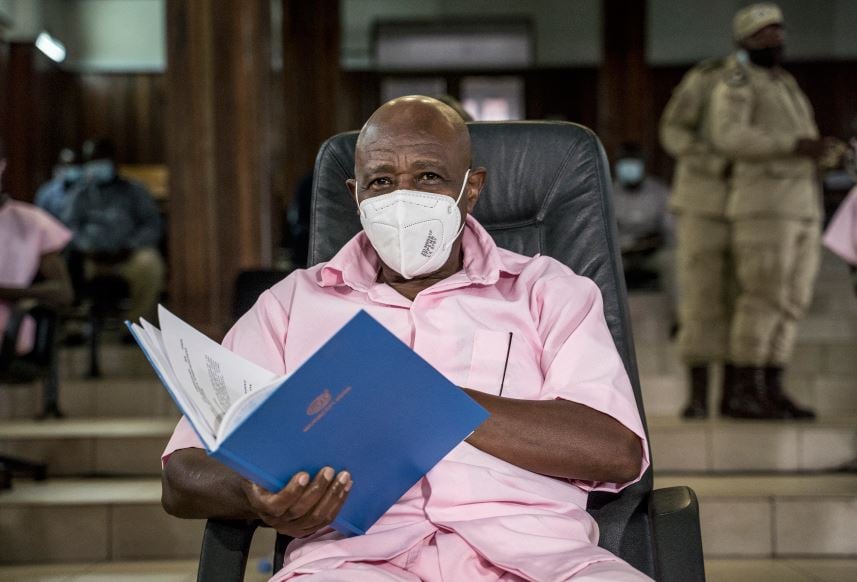Prime
Paul Rusesabagina: 'Hotel Rwanda' hero and convicted terrorist

Paul Rusesabagina looks on as he sits with some of his coaccused at the Supreme Court in Kigali on February 17, 2021. AFP/ PHOTO
What you need to know:
- Outside the country, his journey from celebrated hero to government nemesis went mostly unnoticed until August 2020, when Rusesabagina suddenly reappeared in Rwanda in handcuffs and prison uniform
The mild-mannered hero of "Hotel Rwanda" credited with saving hundreds of lives during the 1994 genocide, Paul Rusesabagina evolved into Kigali's highest-profile and sharpest-tongued critic before being convicted of terrorism.
The unassuming hotel manager in a smartly pressed suit became the world's most famous Rwandan after the film's release, but angered his government by using the Hollywood limelight to crusade for political change in his tightly controlled homeland.
Outside the country, his journey from celebrated hero to government nemesis went mostly unnoticed until August 2020 when Rusesabagina suddenly reappeared in Kigali, frail and bald in handcuffs and the pink uniform worn by prisoners in Rwanda.
A year later, the 68-year-old was sentenced to 25 years in prison on terror charges.
His family said Rusesabagina -- whose sentence was commuted on Friday by presidential decree -- was a political prisoner denied a fair trial who had suffered greatly in detention.
"They are depriving him of his medication. They are psychologically torturing him by depriving him any social contact with anyone, even in the prison. They are denying him of his legal rights," his niece and adopted daughter, Carine Kanimba, told Nigerian broadcaster News Central TV in January.
The United States said Rusesabagina -- who holds Belgian citizenship and a US Green Card -- was "wrongfully detained" and calls for his release attracted political and celebrity support.
'Ordinary man'
Born in 1954 to farmers in central Rwanda, Rusesabagina briefly studied theology after school before taking a job at a hotel and studying hospitality in Kenya and Switzerland.
Back in Rwanda in 1984, he was hired as assistant general manager at the most prestigious hotel in Kigali at the time -- the Hotel des Mille Collines, a five-star Belgian-owned establishment.
In April 1994, when the genocide began, Rusesabagina was besieged inside the Mille Collines with his family and hundreds of guests -- mainly ethnic Tutsis like his wife -- seeking refuge from machete-wielding mobs outside the hotel gates.
Rusesabagina, a moderate Hutu critical of the extremist regime, appeased the killers with beer and used his connections to barter for food as guests drank pool water in desperation.
Late at night, he sent SOS appeals to European governments and then US-president Bill Clinton using the hotel fax line.
American journalist Philip Gourevitch, who met Rusesabagina while researching the genocide, described "a mild-mannered man, sturdily built and rather ordinary-looking".
"That is how he seemed to regard himself as well, as an ordinary person who did nothing extraordinary in refusing to cave in to the insanity that swirled around him," Gourevitch wrote in his 1998 book "We Wish to Inform You That Tomorrow We Will Be Killed With Our Families".
Fiery critic
Rusesabagina returned to work but became disillusioned with the new Tutsi-dominated government that ousted the Hutu regime and ended the 100-day slaughter that left about 800,000 Rwandans dead.
He accused the Rwandan Patriotic Front (RPF), particularly its leader Paul Kagame, of authoritarianism and promoting anti-Hutu sentiment as the new rulers violently consolidated their power after the genocide.
Rusesabagina left Rwanda in 1996 along with other moderates who believed the space for political opposition was fast shrinking. He relocated to Belgium with his wife and children and faded into obscurity.
But the 2004 release of "Hotel Rwanda" made Rusesabagina an overnight celebrity.
He was awarded the US Presidential Medal of Freedom, and toured the globe warning of the evils of man.
Over time, he increasingly used his new platform to thunder against Kagame and the RPF in fiery tirades that alienated some allies and attracted powerful enemies.
He came under relentless attack, with Kagame supporters shouting him down at speaking events all over the world.
Survivors from the Mille Collines turned against him, accusing Rusesabagina of profiting from their misery and embellishing his heroics.
As the hounding intensified, Rusesabagina's rhetoric turned darker and he became closely involved with exiled political opposition groups.
Enemy of the state
In a 2018 video, he pledged support for the National Liberation Front -- an armed group considered a terrorist organisation by Rwanda.
"The time has come for us to use any means possible to bring about change in Rwanda, as all political means have been tried and failed," he said.
Two years later, Rusesabagina boarded a plane he believed was bound for Burundi but landed instead in Rwanda.
He was arrested, put on trial as an enemy of the state, and found guilty of founding and financing a rebel group responsible for a string of deadly attacks inside the East African country.
He became the focus of a global campaign to secure his release that enjoyed support from Hollywood stars including Scarlett Johansson, Joaquin Phoenix and Don Cheadle, who played Rusesabagina in the 2004 Oscar-nominated blockbuster.
In 2022, his family filed a $400 million lawsuit in the United States alleging that high-ranking Rwandan government officials, including Kagame, conspired an "elaborate plot" to abduct and torture Rusesabagina.





